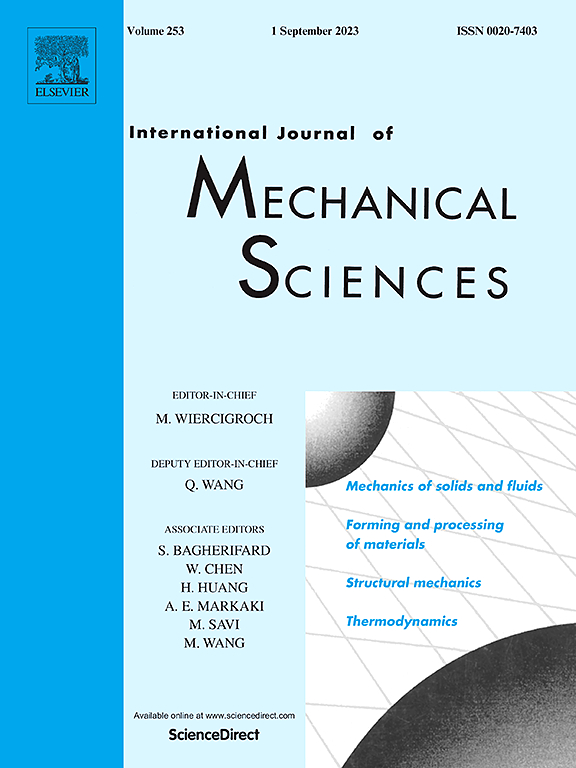Bayesian protocols for high-throughput identification of kinematic hardening model forms
IF 7.1
1区 工程技术
Q1 ENGINEERING, MECHANICAL
International Journal of Mechanical Sciences
Pub Date : 2024-10-18
DOI:10.1016/j.ijmecsci.2024.109791
引用次数: 0
Abstract
Constitutive models are essential for assessing the mechanical response of complex materials, yet uncertainties in model forms and parameters persist due to the influence of micromechanisms and microstructural features. We develop Bayesian protocols to iteratively refine both model forms and the associated material properties for complex constitutive models. Our aim is to provide rigorous, probabilistically informed evaluations of improvements achieved with increasing model complexity. Leveraging high-throughput experimental microindentation data, the protocols involve three steps: (i) emulating FE simulations using multi-output Gaussian process surrogate models, (ii) calibrating an initial simple constitutive model against experimental data, and (iii) progressively enhancing model complexity by iteratively improving agreement between simulations and experiments. The various model forms are compared using model form probabilities and aggregate discrepancies. Sobol indices are used to quantify the identifiability of material properties, aiming to prevent parameter proliferation. We apply this protocol to identify the optimal form of cyclic plasticity models for duplex Ti-6Al-4V. Although tailored for cyclic plasticity models, these protocols hold promise for calibrating and refining nonlinear constitutive models across diverse material classes.

高通量识别运动硬化模型形式的贝叶斯协议
构效模型对于评估复杂材料的机械响应至关重要,但由于微观力学和微结构特征的影响,模型形式和参数的不确定性依然存在。我们开发了贝叶斯协议,用于迭代完善复杂构成模型的模型形式和相关材料属性。我们的目标是对模型复杂度不断增加所实现的改进进行严格的概率评估。利用高通量实验微压痕数据,该协议包括三个步骤:(i) 使用多输出高斯过程代理模型模拟 FE 仿真,(ii) 根据实验数据校准初始简单构成模型,(iii) 通过迭代提高仿真与实验之间的一致性来逐步提高模型的复杂性。利用模型形式概率和总体差异对各种模型形式进行比较。Sobol 指数用于量化材料特性的可识别性,目的是防止参数扩散。我们采用这一方案来确定双相 Ti-6Al-4V 循环塑性模型的最佳形式。虽然这些规程是为循环塑性模型量身定制的,但它们有望用于校准和完善各种材料类别的非线性结构模型。
本文章由计算机程序翻译,如有差异,请以英文原文为准。
求助全文
约1分钟内获得全文
求助全文
来源期刊

International Journal of Mechanical Sciences
工程技术-工程:机械
CiteScore
12.80
自引率
17.80%
发文量
769
审稿时长
19 days
期刊介绍:
The International Journal of Mechanical Sciences (IJMS) serves as a global platform for the publication and dissemination of original research that contributes to a deeper scientific understanding of the fundamental disciplines within mechanical, civil, and material engineering.
The primary focus of IJMS is to showcase innovative and ground-breaking work that utilizes analytical and computational modeling techniques, such as Finite Element Method (FEM), Boundary Element Method (BEM), and mesh-free methods, among others. These modeling methods are applied to diverse fields including rigid-body mechanics (e.g., dynamics, vibration, stability), structural mechanics, metal forming, advanced materials (e.g., metals, composites, cellular, smart) behavior and applications, impact mechanics, strain localization, and other nonlinear effects (e.g., large deflections, plasticity, fracture).
Additionally, IJMS covers the realms of fluid mechanics (both external and internal flows), tribology, thermodynamics, and materials processing. These subjects collectively form the core of the journal's content.
In summary, IJMS provides a prestigious platform for researchers to present their original contributions, shedding light on analytical and computational modeling methods in various areas of mechanical engineering, as well as exploring the behavior and application of advanced materials, fluid mechanics, thermodynamics, and materials processing.
 求助内容:
求助内容: 应助结果提醒方式:
应助结果提醒方式:


